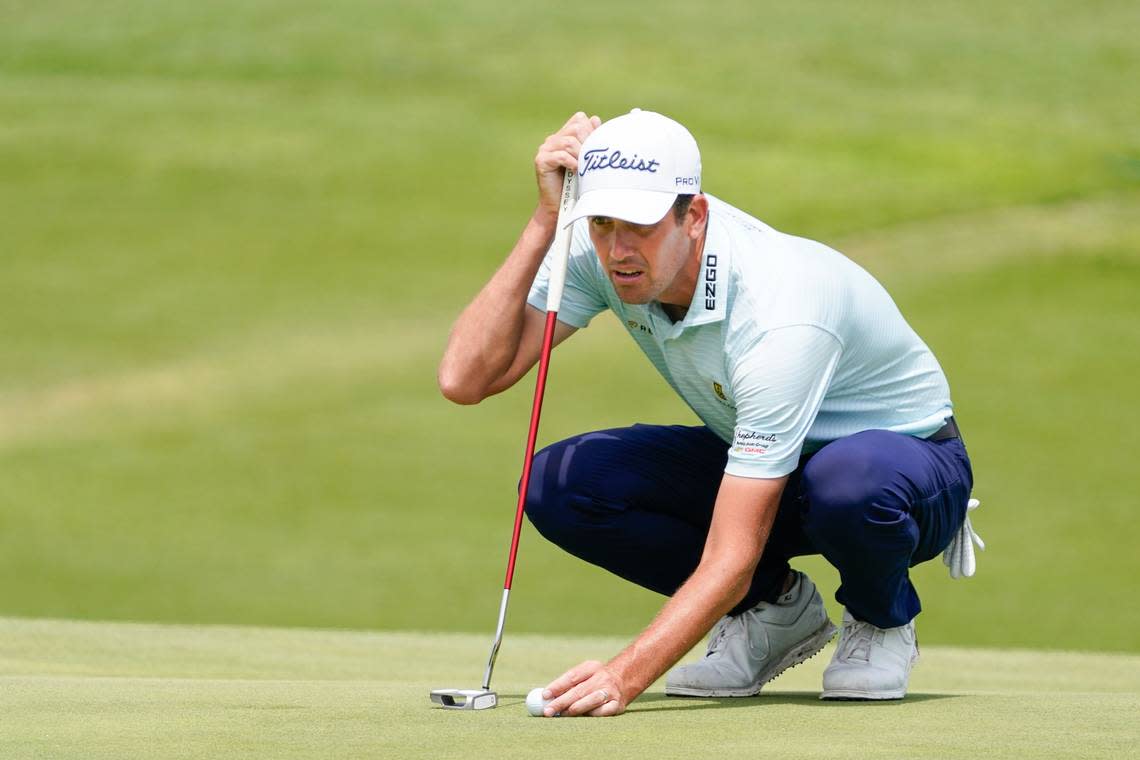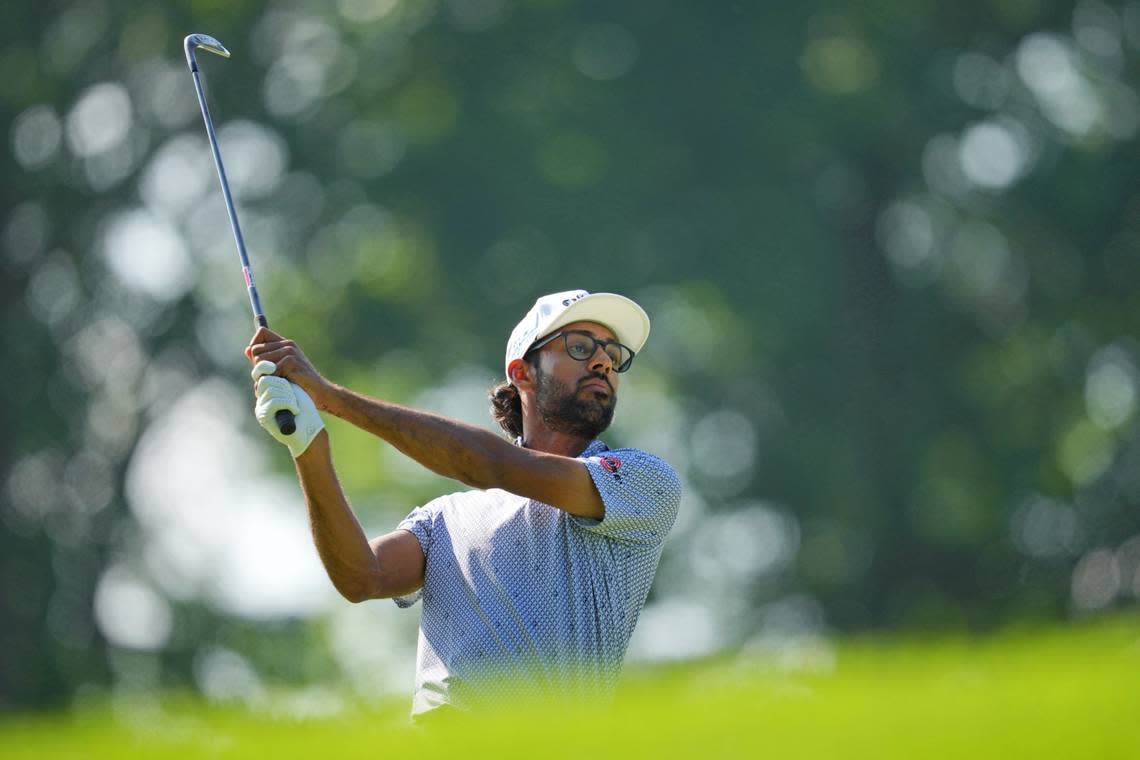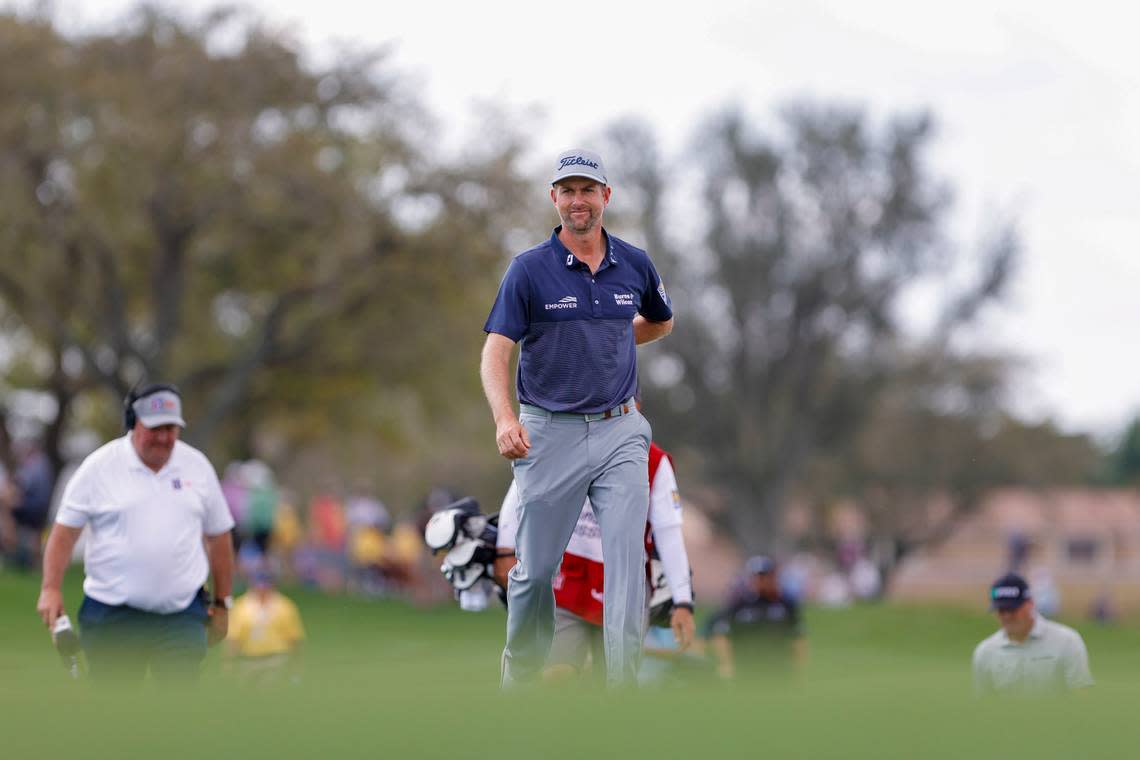US Open at Pinehurst features six Triangle players as region becomes pro golf hotbed
They started out in a group of four and a group of three, hitching a ride down the 18th fairway at Duke University Golf Course to join a seven-player playoff for two spots in the U.S. Open, to be played just down the road in Pinehurst.
For Ryan Gerard and Carter Jenkins, the stakes could hardly have been higher. Both from Raleigh, both playing just below the PGA Tour level on the Korn Ferry Tour, both having competed in their hometown a day earlier in the UNC Health Championship. After 36 holes on Monday, it would still take at least one more to hand out the final spots in a major played in their backyard.
Jenkins survived, going birdie-par to clinch one of the spots, completing a six-player 919 contingent at Pinehurst Resort and Country Club this week as the Open returns for the first time in a decade. Two others made it through final qualifying at Duke without a playoff, Chesson Hadley and 2012 champion Webb Simpson.
Brendon Todd qualified at another site, in Ohio, ahead of the Memorial. Ben Griffin just missed in Canada after finishing second in the Canadian Open. And Akshay Bhatia and Ben Kohles were both exempt, Bhatia from the Official World Golf Ranking, Kohles for finishing atop the Korn Ferry points standings last year.

“Golf is just such a prevalent sport around here,” Hadley said. “With Pinehurst so close, I think that helps. I was thinking about that and talking about that with somebody else, how many great pros are out of Raleigh. I never knew Ryan (Gerard), but he’s from Raleigh, and obviously a great player. So it’s cool. It’s really cool that the Triangle has that.”
It’s a big group with deep local roots, and it’s also the clearest sign yet of how much golf has grown in the Triangle. An area that for decades produced one PGA Tour winner — Scott Hoch, who won 11 times from 1980-2023 even if he was better known for missing the gimme putt that cost him the 1989 Masters — has now seen local players win seven times in the five past years, as well as Doc Redman’s 2017 U.S. Amateur.
Before Grayson Murray’s tragic death last month, the Triangle had eight players regularly competing on the PGA Tour, and another three playing on the Korn Ferry. Those numbers are comparable with major metro areas like Denver, Houston and San Francisco. And with two young amateurs in the top 60 of the World Amateur Golf Ratings, more are coming up from behind.
“There’s something to be said for the location,” said Robb Wade, the director of N.C. State’s Professional Golf Management program. “I don’t know if we’re in a hotbed of golf necessarily, but it’s a pretty good spot for golf. There’s a plethora of good golf courses, you get to play with good players and you get to be around good players and good teachers. There’s a lot of resources here that allow golfers to get better.”
Hadley, Simpson among locals to clinch US Open spot at Pinehurst in Duke qualifier
A pro golf explosion
Their paths were different. Some honed their games at private clubs like Carolina Country Club and North Ridge Country Club. Others grew up playing public courses like The Heritage and Wildwood Green. Many played college golf in the ACC, while Bhatia skipped college altogether. But they have arrived back close to home, in Pinehurst, to represent the Triangle like never before.
Hoch was the first Raleigh golfer to make it big, and for a long time the only one. At about the same time, the late Vance Heafner was making a living on the PGA Tour, winning the 1981 Disney World Team title with Mike Holland, before he became the longtime pro at Prestonwood Country Club.
For many years, the Triangle’s best — or at least most decorated — player was an amateur: Paul Simson, who won the North & South Amateur in Pinehurst and pretty much every senior title there was to win. Ty Tryon became the youngest player ever to earn a tour card at age 17, but became a cautionary tale instead. And there were pros who lived here, often after playing at N.C. State or Campbell, like Carl Pettersson, who grew up in Greensboro but made Raleigh his home.
In terms of golf success, that was really it. Very little of it was homegrown. And then, over the past 20 years, the Triangle exploded onto the tour.
When Simpson won the Wyndham in 2011, he was the first Triangle golfer to win a tour event since Hoch won at Doral in 2003. A year later, Simpson won the U.S. Open at the Olympic Club, his third win in two summers. He won again in 2014, and Hadley and Todd both won that summer as well.

And now, since Simpson won twice in the COVID-shortened 2020 season, Bhatia has won twice and Murray won once. Kohles also won twice on the Korn Ferry last summer to earn his spot on the big tour this year.
Meanwhile, the Triangle has surpassed Charlotte and the Triad at the youth level. Mark Brazil, the longtime tournament director of Greensboro’s Wyndham Championship, came from the American Junior Golf Association, where he built relationships with many of the state’s top pros as young golfers. (Simpson stayed at Brazil’s Hilton Head condo when he won the RBC Heritage in 2020.) He keeps close tabs on all of them now, because the Wyndham leans heavily toward in-state players when it comes to handing out sponsor exemptions.
“The Triangle is the strongest area in North Carolina as far as top junior golfers,” Brazil said. “You can see it at our AJGA event.”
The question is, why now? Because it’s unquestionably unprecedented.
Take the train to Pinehurst? You can during next month’s US Open golf tournament in NC
Access and opportunity
Some of it certainly has to do with the rapid growth of the Triangle itself since 2000, since many of the same advantages the Triangle has now — access to quality instruction and courses, both public and private, the high quality of college golf at all three ACC schools (and Campbell as well) — existed then. What’s happened in golf has been mirrored in other sports, most notably hockey. But Simpson certainly helped show the way, and the so-called Tiger Effect launched a new generation of golfers both here and everywhere after his first Masters win in 1997.
“Webb has been a very influential person, making it on the PGA Tour,” Brazil said. “He’s been like an idol for a lot of guys.”

John McConnell has invested heavily in junior golf since adding Wakefield Plantation and Raleigh Country Club to his stable of courses, both of which have hosted what’s now called the UNC Health Championship, which was played for the first time in 1994. The McConnell Golf Scholarship Program has included Murray, Bhatia and Jenkins, providing access and supervision for promising junior players.
Prestonwood has hosted the senior-circuit SproviAS Championship since 2001, making professional golf an biannual spectator sport here, not to mention Pinehurst’s star turn as a U.S. Open site — hosting in 1999, 2005 and 2014 before becoming an anchor site for the USGA that will see the Open visit not only this week but in 2029, 2035, 2041 and 2047.
Curiously, despite access to many of the same benefits, there hasn’t been the same explosion on the women’s side — yet. The area has produced several tour pros in recent years but none have won an LPGA event, although several, including Cary’s Katherine Hamski, Chapel Hill’s Gina Kim and Cary’s Jennifer Chang, have posted top-10 finishes. Chang has made more than $500,000 on tour and is 62nd on the points list on the second-tier Epson Tour this year.
Perhaps the area’s most distinguished recent product on the women’s side is one who decided not to turn pro — Emilia Migliaccio, who won a state title at Athens Drive and went straight into broadcasting after playing at Wake Forest. She has continued to compete as an amateur, including last summer’s Women’s Open at Pebble Beach, where she both played and appeared on television.
But that may just be a matter of time. (It may also have something to do with the fact the Triangle hasn’t hosted an LPGA tournament since 1981.) Or maybe it will take that one breakthrough star to pave the way, to show that it can be done, the way Simpson blazed a trail for the many who have come after.
“You don’t have to be from Texas, you don’t have to come from Ireland to play on the PGA Tour,” Wade said. “You can be from Raleigh, North Carolina, and make it just as well as anybody else. When you see somebody that’s your next-door neighbor, in essence, make it, it’s a little easier to say you can do it: He played at Wildwood, I can do it, too.”
In 2014, there were two locals who played at Pinehurst: Simpson and Todd. A decade later, there will be three times as many. Murray was qualified as well, and Griffin’s likely to miss by only a few rankings points after missing the cut at the Memorial. It’s a big group, bigger than ever, and only likely to get bigger by the next time the Open returns.
As pro golf returns to Raleigh this week, emotions raw following Grayson Murray’s death
Uniquely NC is a News & Observer subscriber collection of moments, landmarks and personalities that define the uniqueness (and pride) of why we live in the Triangle and North Carolina.
Never miss a Luke DeCock column. Sign up at tinyurl.com/lukeslatest to have them delivered directly to your email inbox as soon as they post.
Luke DeCock’s Latest: Never miss a column on the Canes, ACC or other Triangle sports
